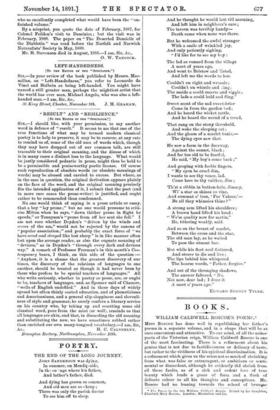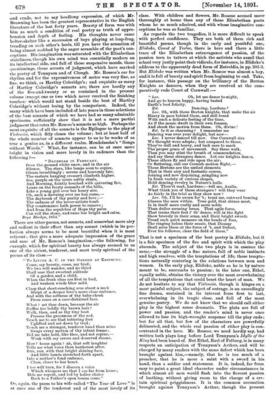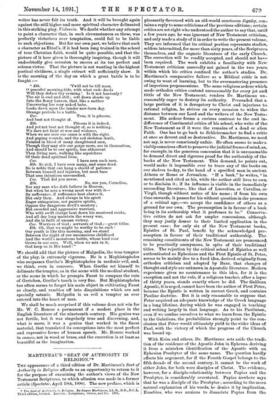BOOKS.
WILLIAM CALDWELL ROSCOE'S POEMS.* •
Miss RoscoE has done well in republishing her father's poems in a separate volume, and in a shape that will be at once convenient and attractive. To our mind, of all the minor poets of the Victorian reign, William Caldwell Roscoe is one of the most fascinating. There is a refinement about his genius that is not due to fastidiousness or delicacy of taste, but rather to the vividness of his spiritual discrimination. It is a refinement which gives us the sense not so much of shrinking from what was false or extravagant, or ambitious or senti- mental or discordant, although he evidently did shrink from all these faults, ae of a rich and ardent love of true beauty which lends a grace of form and a flush of delicate colour to all his thoughts and conceptions. Mr. Roscoe had no leaning towards the school of brusque • The Poems by the late William Caldwell Roscoe. Edited by his daughter. Elizabeth Mary Roscoe. London: Macmillan and Co. and crude, not to say headlong expression, of which Mr. Browning has been the greatest representative in the English literature of the last forty years. Beauty of form was with him as much a condition of real poetry as truth of appre- hension and depth of feeling. His thoughts never came helter-skelter like a succession of boys playing at leap-frog, treading on each other's heels, till you have the sensation of being almost mobbed by the eager scramble of the poet's con- ceptions. His imagination was saturated with the Elizabethan stateliness, though his own mind was essentially modern on its intellectual side, and full of those suspensive moods, those questionings, those arrests of judgment, which have marked the poetry of Tennyson and of Clough. Mr. Roscoe's ear for rhythm and for the expressiveness of metre was very fine, as fine, we think, as Hartley Coleridge's ; and exquisite as many of Hartley Coleridge's sonnets are, there are hardly any of the five-and-twenty or so contained in the present volume (except one or two which never received the finishing touches) which would not stand beside the best of Hartley Coleridge's without losing by the comparison. Indeed, the many which have been included of late years in those selections of the best sonnets of which we have had so many admirable specimens, sufficiently show that it is not a mere partial judgment that rates Mr. Roscoe's sonnets so high. Perhaps the most exquisite of all the sonnets is the Epilogue to the play of Violenzia, which fitly closes the volume; but at least half of the whole number of sonnets appear to us to be works of as true a genius as, in a different realm, Mendelssohn's "Songs without Words." What, for instance, can be at once more bright in vision and more lovely in its cadences than the following ?—
"DAYBREAK IN FEBRUARY.
Over the ground white snow, and in the air Silence. The stars, like lamps soon to expire, Gleam tremblingly ; serene and heavenly fair, The eastern hanging crescent climbeth higher. See, purple on the azure softly steals, And Morning, faintly touched with quivering fire, Leans on the frosty summits of the hills, Like a young girl over her hoary sire.
Oh, such a dawning over me has come,—
The daybreak of thy purity and love ;- The sadness of the never-satiate tomb Thy countenance hath power to remove ; And from the sepulchre of Hope thy palm Can roll the stone, and raise her bright and calm.
Bryn Rhedyn, 1854."
There are other poems, not sonnets, and somewhat more airy and radiant in their effect than any sonnet (which in its per- fection always seems to be most beautiful when it is most reticent), that give a more adequate impression of the grace and ease of Mr. Roscoe's imagination,—the following, for example, which for spiritual beauty has always seemed to us one of the airiest, tenderest, and most truly spiritual of the
poems of its class:— "To LITTLE A. C. IN THE GARDEN AT EASTBURV.
Come, my beauty, come, my bird; We two will wander, and no third Shall mar that sweetest solitude Of a garden and a child, When the fresh elms are first in bud, And western winds blow mild.
Clasp that short-reaching arm about a neck Stript of a deeper love's more close embrace, And with the softness of thy baby-cheek Press roses on a care-distained face.
What ? set thee down, because the air Ruffles too boldly thy brown hair ?
Walk, then, and as thy tiny boot Presses the greenness of the sod, Teach me to see that tottering foot Uplifted and set down by God ; Teach me a stronger, tenderer hand than mine Sways every motion of thy infant frame ;
Bid me take hold, like thee, and not repine,—
Weak with my errors and deserved shame.
How ? home again ? ah, that soft laughter Tells me what voice thou hankerest after. Run, run, with that bright shining face, And little bands stretched forth apart, Into a mother's fond embrace, Close, closer to her heart.
I too will turn, for I discern a voice Which whispers me that I am far from home; Bids me repent, and led by holier choice Back to a Father's open bosom come."
Or, again, the poem to his wife called "The Year of Love" is at once one of the tenderest and of the most lovely of its
class. With children and flowers, Mr. Roscoe seemed more thoroughly at home than any of those Elizabethan poets whom he so much admired, and with whose imaginative con- ceptions he was so familiar.
As regards the two tragedies, it is more difficult to speak with perfect confidence. They are both of them rich and beautiful poems, though in the early and youthful one, Eliduke, Count of Yveloe, there is here and there a little trace of the Elizabethan extravagance of passion, of the passion torn to tatters at which the satirists who assail that school very justly point their ridicule, for instance, in Eliduke's address to the apparently dead form of Estreldis, in pp. 202-3. But Eliduke was written when Mr. Roscoe was almost a boy, and it is full of beauty and spirit from beginning to end. Take, for instance, this passage on the brilliancy of the Breton Knights as dancers, when they are received at the com- paratively rude Court of Cornwall :— "Lar.
Oh, let me dance to-night, And go to heaven happy, having tasted Earth's best felicity.
Est. Dancing, Lardune ? Lar. Oh, with these Breton knights, that make the air
Heavy in pace behind them, and still tread With such a delicate feeling of the time, As if the music dwelt in their own frames, And shook the motion from them. Oh, divine !
.Est. Is it so charming? I remember me
Dancing was ever your delight, but now-
Lar. I never danced till now. Our Cornwall sirs
We thought were adepts ; but compared to these, They're dull and heavy, and lack ears to mark The proper grace of movement. Say these walk, Then you may stint the breath of commendation, And say these strangers dance. Let our knights dance, These others fly and ride upon the air;
Or flattering, call our Cornish motion flight,—
These Bretons are the untied elements That in their airy and fantastic course, Joining and now disjoining, mingling now In fresh variety of curious shapes, Hold dancing revelry in Nature's halls.
.Est. Thou'rt mad, Lardune;—tell me, Azalia,
What think you of these strangers ? will they wear As fairly in the trial as they show now ?
Lar. Oh, I'll be sworn for 't; trust me, outward bearing
Glasses the man within. True gold, that shines most, Is in itself more costly and more noble
Than duller seeming brass. That agile force,
That trains their feet i th' dance, will in the fight Show bravely in their arms, and their bright swords Tread such quick measure on the heads of foes,
The ringing helms their music, that Dismay
Shall seize them at the force of 't, and Defeat, Ever his follower, clear the field of them."
That is not a specimen of the best poetry in Eliduke, but it is a fair specimen of the fire and spirit with which the play abounds. The subject of the two plays is in essence the same,—the struggle of a fine nature, full of noble instincts and high resolves, with the temptations of life, those tempta- tions naturally centering in the relations between men and women. In the early play, Eliduke, noble as he is by nature meant to be, succumbs to passion ; in the later one, Ethel, equally noble, obtains the victory over the most overwhelming of all the temptations that could beset the heart of man. We do not hesitate to say that Violenzia, though it hinges on a. most painful subject, the subject of outrage, is an exceedingly fine drama, sustained in its interest from first to last, overwhelming in its tragic close, and full of the most genuine poetry. We do not know that we should call either play in the highest sense dramatic. The plots are full of power and passion, and the reader's mind is never once allowed to lose its high-wrought suspense till the play ends;. but for all that, but few of the characters are powerfully delineated, and the whole real passion of either play is con-- centrated in the hero. Mr. Roscoe, we need hardly say, had written both plays long before Lord Tennyson's Idylls of the King had been heard of. But Ethel, Earl of Felborg, is in many respects an anticipation of Tennyson's Arthur, and will be- charged by many readers with the same defect which has been brought against him,—namely, that he is too much of a preacher, that he is more a saint with a sword in his_ hand, than a soldier and statesman. It is, indeed, far from easy to paint a great ideal character under circumstances in which almost all men would flash into the fiercest passion of loathing, without giving room to the charge of a cer- tain spiritual priggishness. It is the common accusation brought against Tennyson's Arthur, though the present. writer has never felt its truth. And it will be brought again against the still higher and more spiritual character delineated in this striking play, Violenzia. We doubt whether any attempt to paint a character that, in such circumstances as these, was perfectly victorious over temptation, could fail to be liable to such objections. But for our own part, we believe that such a character as Ethel's, if it had been long trained in the school of true Christian faith, would be quite possible, and that the picture of it here given is thoroughly inspiring, though it will undoubtedly give occasion to sneers at its too perfect and solemn virtue. That the picture is not wanting in the highest poetical vividness, a single extract will sufficiently show. It is the morning of the day on which a great battle is to be fought :— "Eth. 'Twill not be till noon.
0 peaceful morning-tide, with what rude deeds Will they deface thy evening ! Is it not heavenly ? The air is cool and still ; soft dawn shoots up Into the fleecy heaven, that, like a mother Uncovering her rosy naked babe, Looks down upon the tender new-born day. Strange prelude to a battle.
Cor. True, it is piteous, And best not thought of.
Eth. Piteous it is indeed, And yet not best not thought of, so is nothing.
We dare not faint at woe and violence, When we are sure our cause is with the right.
And gaping wounds, and the red skeleton death, Painted in blood of many slaughtered men, Though they may stir our gorge more, are in themselves, And should be to our spirits, less abhorrent Than living men, walking like sepulchres Of their dead spiritual lives.
Cor. I have seen such men.
Eth. So sick, I have seen many, and some dead. He is noble that can hang a shield of patience Between himself and injuries, but most base That sees injustices unremedied.
Cor. That did you never. Eth. No, nor you, Cornelius,
Nor any man who doth believe in Heaven,
But when he sees a wrong must war with it—
By sufferance, if sufferance best abates it, But only then. And always in his spirit Eager antagonism, not passive spirits, Oppose the dangerous devil's mastery ; But sworded and aggressive warriors, Who with swift charge beat down his mustered ranks, And all day long maintain the weary war, And die in faith of unseen victory.
Cor. Warriors of God ; servants of God ;—great titles.
Eth. Oh, that we might be worthy to be such !
Our youth is like this morning, and we stand Between the night of our unconscious childhood And the world's monstrous battle, whose loud roar Grows in our ears. Well, when we mix in it, God keep us in His hand !"
We should add that the picture of Malgodin, the true tempter of the play, is extremely vigorous. He is a Mephistopheles who surpasses Goethe's Mephistopheles in sardonic evil, and, we think, even in resource. When Goethe set himself to delineate the tempter, as in the scene with the medical student, or the scene in which he prompts Faust to compass the ruin of Gretchen, Goethe's touch is very fine. But Mephistopheles too often seems to forget his main object in cultivating Faust so closely, and rambles off into disquisitions which are not specially satanic. Malgodin is as evil a tempter as ever entered into the heart of man.
We shall be much surprised if this volume does not win for Mr. W. C. Roscoe a permanent if a modest place in the English literature of the nineteenth century. His genius was not fertile, but it was singularly true and discerning, and, what is more, it was a genius that worked in the finest material, that translated its conceptions into the most perfect and expressive forms of human speech. Mr. Roscoe worked in cameo, not in wood or brass, and the execution is at least as beautiful as the imagination.








































 Previous page
Previous page